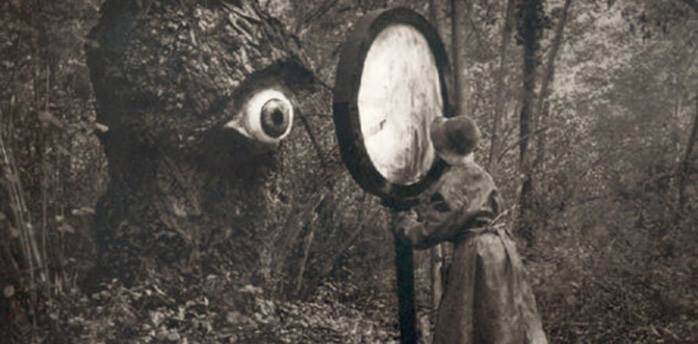Dobson once found himself marooned on a remote atoll. The circumstances were inexplicable. He had a vague memory of toppling from the deck of a barquentine, but could not recall what he was doing aboard the boat in the first place. Nor did he remember how he came to be washed up on a barren sea-girt rock. But there he was, and he had to lump it.
As a mostly deskbound pamphleteer, Dobson had never found cause to undergo rigorous training in basic survival skills, so the first few minutes on the atoll were emotionally wrenching, to say the least. In fact Dobson could not recall such an emotionally wrenching experience since he had attended a performance of Binder’s third symphony. The conductor on that occasion was the psychotic maestro Lothar Preen, and his approach to that piccolo and glockenspiel business in the final movement caused in Dobson the welling up of the most wrenching emotional experience he had ever had. He remembered the music as he sat slumped on the atoll, staring at the sea, though the sound in his head was of an LP recording conducted by Binder himself, where the piccolos and glockenspiel were slightly less emotionally wrenching than in Preen’s hands. Dobson was not overly fond of what he considered Binder’s somewhat clinical treatment of his own symphony. He once wrote an intemperate letter to the composer, insisting that he rerecord all the LPs of his music with more oomph, but tore it up before sending it, not from second thoughts but because he did not have Binder’s postal address and did not at the time have the energy or wherewithal to hunt it down.
Energy and wherewithal, however, were precisely what he needed to call upon if he were to survive his maroonment on a remote atoll, and to his credit Dobson did not shilly-shally. His first thought was of food, and then of water, and then of shelter. It was almost as if he had undergone rigorous training in basic survival skills! He wondered briefly if he had attended a course of instruction in a dream. Dobson often had vivid dreams, and wrote down the details upon waking. He fossicked in the pockets of his overcoat for his notebook, thinking that perhaps he might find a list of hints and tips on basic survival skills scribbled down one dawn before the dream faded. As he rummaged, his fingers fell upon something unfamiliar, and taking it from his pocket he found he was clutching a packet of frozen crinkle-cut oven chips.
The food problem, then, was solved, at least for the time being. Or so Dobson thought. He could either suck the chips as he would ice lollies, or he could lay them out on the atoll and let them thaw in the sunlight. Stupidly, he decided on the latter. No sooner had he torn open the packet and laid the frozen chips out in neat rows upon the barren rock than a formidable flock of seagulls came swooping out of the sky and snatched up every single chip in their terrible beaks. Thus Dobson experienced a third wrenching of the emotions, perhaps the most emotionally wrenching to date. Such was its intensity that Dobson leapt to his feet and shook his fist at the sky and screamed his head off at the seagulls. But the seagulls had already flown far far away, perhaps to another atoll, where they would perch awhile and scoff their crinkle-cut chips. Seagulls will eat anything.
A little sprite within Dobson’s head told him that he was wasting his energy, so he sat down and gazed about him. This was when he noticed that there were various creatures, such as barnacles and limpets and mussels, clinging to the rock. They were not frozen and did not need thawing. He wrote the word “Food” in his notebook and placed a tick next to it.
Dobson had read a number of books about atoll maroonment, and it was the memory of these he now drew upon. He could collect rainwater in his upturned hat, for example. It was not raining, but Dobson was wearing a yachting cap, so he took this off and placed it, upside down, on as level a patch of rock as he could find. As he did so, he felt a pang of great perplexity, for he could not remember ever seeing the yachting cap before. How had he come to be wearing it? It must be connected in some way to the barquentine from which he had a vague recollection of having toppled into the sea. It was not the sort of headgear he would normally choose to wear. He was a Homburg man through and through, except for those occasions when he sported a floppy and shapeless thingummy or a battered leaden crown. But stylish or not, the yachting cap would catch rainwater, if and when rain fell. Dobson looked up at the sky, and saw a cloud. It was quite white, and very high above him. It only bloomed for minutes, and when he looked up again, it vanished on the air. He took his notebook, wrote the word “Water”, and placed a question mark next to it.
The last item on his agenda was shelter. It was a particularly wrenching emotional moment when he admitted to himself that there was no sign either of foliage or of a tatty tarpaulin abandoned by a previous maroonee. Dobson was at the mercy of the elements. He thought of that passage in Binder’s tenth symphony when the four elements are evoked by mordant bassoon toots, and he began to weep.
Then he remembered something else he had read in one of those books, that always, sooner or later, a ship full of Jesuits would appear, and one need only dance and hop like a mad thing, waving one’s arms, and they would sail in to the rescue. Or perhaps it was the Jesuit who was marooned, and the ship’s crew were just ordinary sailors. Whichever way round it was, the dancing and hopping and waving was the important thing. And so he practised those disciplines, with great vim and vigour, while munching thirstily on barnacles, until a ship hove into view on the horizon. It was the HMS Gerard Manley Hopkins, and it took him home at last.
Originally posted in 2012.



